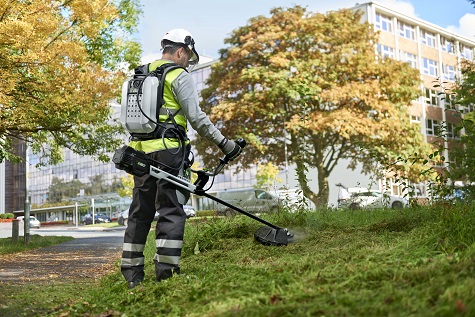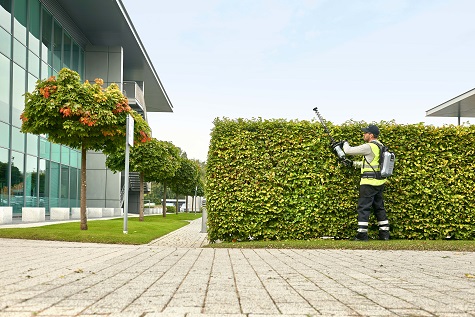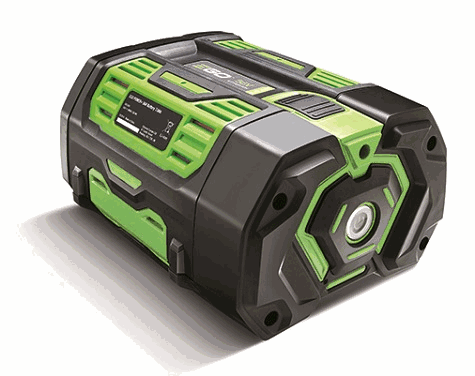Battery-powered outdoor power tools are surging in popularity. For a while, they have been a convenient choice for domestic gardeners however the health, noise and cost benefits of using battery over their fossil-fuelled counterparts are now turning the heads of professionals, says Vince Brauns, European Product Manager at EGO UK.
In the world of professional landscaping and grounds maintenance, petrol has been the fuel of choice for over 100 years – mainly because there has been no viable challenger. Recently however, battery-powered cordless equipment has gained worldwide popularity and increased market share, signaling the most significant shift in the sector for decades.

Ears to the Ground
A reduction in noise pollution is just one of the benefits driving the industry’s journey to an all-electric future. The World Health Organization (WHO) considers noise to be second only to air quality as the largest environmental cause of health problems.
Equally, on a website dedicated to noise pollution, the European Commission writes: ‘Prolonged exposure to noise can lead to serious health effects mediated by the human endocrine system and by the brain, such as… cardiovascular diseases, annoyance, cognitive impairment and mental health problems… (which can lead) to a loss of productivity of workers.’
Unsurprisingly therefore, European noise legislation is becoming ever more stringent with both the European Commission’s Machinery Directive 2006/42/EC and the Outdoor Noise Directive 2000/14/EC (OND) looking to regulate noise emissions caused by some 57 types of outdoor equipment – including those used in parks and gardens.
Furthermore, the new Physical Agents (Noise) Directive 2003/10/EC currently sets a maximum exposure limit of 87dB in working environments. Petrol powered equipment exceeds this at operator level (1 metre away). A petrol-powered chainsaw, for example, emits 105 dBA at operator level, while a petrol lawnmower at the same distance emits 96 dBA.
By comparison, a battery-powered mower from EGO emits 87dBA at operator level, while its chainsaw actually falls in at just 85 dBA.
The deafening reality
As a professional, its useful to know the details of EU directives and how your equipment stacks up in comparison. In reality, health effects are more likely to drive one’s decision to ditch the petrol.
It’s no secret that workers exposed to loud noise over a long period of time are more likely to lose their hearing – a phenomenon called noise-induced hearing loss (NIHL). NIHL, caused by damage to sensitive structures in the inner ear, is estimated to affect over 18,000 people in the UK. These sensitive structures, known as hair cells, are tiny sensory cells that convert sound energy into electrical signals that travel to the brain. Once damaged, these hair cells do not grow back. This is why it is wise to understand the level of noise exposure you are subjected to and consider this when replacing tools and equipment.
Fuel for thought
Much like the argument against fossil-fuelled vehicles, emissions from petrol-powered machinery and equipment can cause very real health problems.
In 2017, the Deutsche Umwelthilfe e.V. (Environmental Action Germany) undertook extensive testing of 21 hand held engines, including motor saws and brush cutters, from European suppliers. Their research revealed that nine failed to comply with EU limit values for hydrocarbons and carbon monoxide, while three exceeded the limit value.
This is worrying, as the harmful impact of petrol emissions – especially benzene – are widely documented and understood. According to WHO, regular exposure can lead to a range of acute and long-term adverse health effects and diseases, including cancer and aplastic anaemia.
As a result, the European Commission is making a concerted effort to minimise the damage caused by what it calls NRMMs – ‘non-road mobile machinery’ – including mowers, leaf blowers and chainsaws among others. With zero chemical emissions during use, battery powered cordless equipment is unaffected by these directives – and will remain unaffected well into the future.

Killing time
In addition to adverse health effects, noise created by tools can aggravate residents and the occupants of nearby buildings. When operating in residential and commercial areas, those using petrol-powered tools will be all too familiar with the internal dilemma of what time is too early to start up the 2-stroke engine. Similarly, those working on the grounds of schools and hospitals will have wondered how much disruption their mower, blower or hedge trimmer is causing to the buildings occupants.
Most councils have by-laws that guide construction workers about the standard hours where noisy work is usually acceptable, which is often adhered to by professional landscapers and gardeners too. This usually sits somewhere between 8am and 6pm on weekdays, 8am and 1pm on Saturdays and no work on Sundays.
Like petrol, battery powered cordless equipment is also subject to noise restrictions but is better able to meet the stringent requirements. The net result is that workers can enjoy improved comfort, communication and teamwork, while their business benefits from less disruption and a continuous working schedule.
Up in smoke
For businesses, being able to complete work more quietly allows more jobs to be done in a single day and in turn, increases the productivity of workers. In some cases, this means that the switch to electric may even enable businesses to onboard additional clients and increase their revenues.
It is however, no myth that battery powered equipment is more expensive than petrol in the first instance. Included in the price of your tool is the battery but once it is purchased, it will act as your fuel source for the next four to five years.
As part of its 2014 Procurement Directive, the European Commission encourages public authorities to consider this whole life-cycle cost, rather than just the initial cost of purchase. Although this philosophy of ‘Green Procurement’ has taken root in the public sector, it is increasingly being adopted by private companies looking to maximise their environmental and economic advantage.
Recent research from EGO investigated the total cost of ownership between petrol and battery powered outdoor equipment.
The test looked at the cost of a petrol brush cutter, hedge trimmer and leaf blower compared with their battery-powered counterparts. Initially, buyers would spend approximately £690 extra on battery-powered equipment in year one however would break even in their second year, making a total saving of £365. In years three and four, the real savings of ditching the petrol begin to show themselves with users saving a total of £1,430 and £3,500 respectively.
By the fifth and final year, the test factored in a full replacement of all equipment and yet the savings amounted to a total lifetime saving of over £4,500! In the study, seasonal use of certain tools was considered and as result, fuel equivalents were based upon daily usage of four litres per day over a modest 170 days per year. With more frequent use, payback time would be accelerated even further.
It’s important to note that the payback time of investment will be directly affected by the amount of ‘idle’ time, usage patterns, and even ambient temperatures which affect the energy capacity of the battery. Matching the right batteries to applications is therefore a critical thing to consider.

A brighter future
With rising energy costs and concerns over health, safety and the environment, the use of petrol powered outdoor equipment is coming under increasing scrutiny and is now subject to ever more stringent legislation. Against this, battery powered cordless technology has improved significantly and now offers similar – if not better – performance than petrol alternatives.
The industry now recognises cordless as a truly viable alternative to petrol. With increasing battery power, minimal pollution and increased efficiency gains to be gained, battery-powered landscaping and gardening equipment is going from strength to strength.
To read more about battery v petrol, download the latest whitepaper from EGO here.